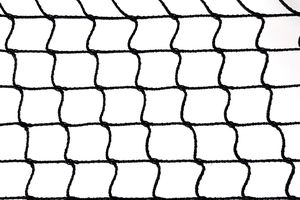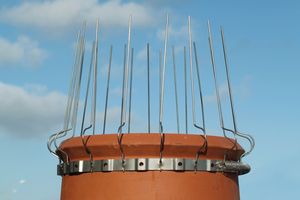UK Bird Nesting Season: Species, Laws & Tips For Dealing With Nesting Birds
Britain is home to over five hundred different species of birds; while it can often be quite tranquil and peaceful to watch the birds in flight, this doesn’t mean that you want them to nest on your property.
During mating and nesting season, the birds can get louder and more territorial making them more of a nuisance.
While, legally, you cannot interfere with a nesting bird by moving or destroying its nest, you are perfectly within your rights to deter the bird from nesting on your property in the first place.
Now, the methods that you use to keep the birds away will vary slightly depending on the birds that you are dealing with.
When is Bird Nesting Season in the UK?
Generally, the nesting season begins in February and can extend until August; however, this is not a hard and fast rule. There are a few things that affect when nesting season is likely to begin in Britain.
As the days get longer during the start of Spring, the hormone prolactin surges which increases the desire to reproduce. There also needs to be more food available with which they could feed the chicks.
Lastly, the rise in temperature after the winter, which is what tends to kick off the desire to reproduce, quite literally making the birds a little hot under the collar.
However, there have been instances where birds have been found to have been nesting as early as December, although this is highly unusual. One of the ways to tell whether the local birds are gearing up to mate is an increase in birdsong.
If you hear more of this, it tends to indicate that they are looking for a mate.
What are the Most Common Birds Found During Nesting Season?
The most common birds found during the nesting season might not be the most prevalent birds in this country. Truthfully, it depends on the nesting conditions that a bird needs and where they are likely to build their nests.
Below are the most common mating birds in Britain, ranging from eleven million pairs (wrens) down to five million pairs (blackbirds & chaffinches).
-
Wren
-
Robin
-
House Sparrow
-
Woodpigeon
-
Blackbird & Chaffinch (tied for fifth place)
The Law Around Nesting Birds
The Wildlife and Countryside Act of 1981 outlines the law surrounding disturbing nesting birds – among other animals and creatures. The act prohibits harm to any bird or egg, whether the harm is deliberate or because of reckless behaviour.
To put it simply, if you see a nesting bird, leave it alone; if you see a nest or eggs, leave it alone.
If you have birds nesting on your property, then, legally, you cannot do anything to physically remove them; all you can do is use humane methods to try to disperse or deter them.
Issues Caused by Nesting Birds
There are birds that prefer to nest in rural areas away from people, but there are also birds that build their nests in built-up areas. For the most part, wildlife and people are perfectly able to co-exist peaceably, but, unfortunately, sometimes, there are issues.
Issue One: Noise
Firstly, the noise, as during mating, and the nesting season as a whole, birds tend to use more birdsongs and mating calls in order to attract mates. This means that they tend to be louder, which can be really annoying if they have chosen your property as their roost.
Issue Two: Bird Droppings
Next, where there are more birds, or where you have an increase in bird activity, i.e. if you have a nest on your property, there is going to be more bird fowl. This can have an effect on the look of your property and even your health in some cases.
Issue Three: Aggressive Behaviour
Finally, birds can be territorial, especially when there are eggs or a nest involved. They are more likely to demonstrate aggressive behaviours in an effort to protect their eggs or their nest. This can be dangerous when you are trying to cohabit.
Trimming Hedges & Agricultural Advice
The best thing that you can do for your property where birds are an issue is to prevent them from being able to build their nests at all. If they can’t find a home on your property, then they are much more likely to leave and never come back.
Think about where the birds are most likely to get comfortable. Hedges and trees are popular places to roost; trim them back to their bare bones as much as possible during nesting season.
While it might not look as pretty, the birds won’t be able to build their nests. Keep potential food sources – like the outdoor bins or any food that you grow – covered and inaccessible.
Bird Nesting Prevention Tips for Homes & Gardens
As mentioned above, you cannot move or destroy an active nest. You can remove an inactive nest, although this is better done outside of the nesting season to ensure that it is, indeed, inactive.
Prevention is the better route, and luckily, there are a few things that you can do to encourage the local birds to find a new place to roost.
Use Bird Netting to Prevent Access to Certain Areas
Firstly, it is worth installing bird netting to prevent the birds from even getting a perch in certain areas. You can use these to cover hedges, trees, planters and even your home.
The nets themselves are pretty easy to install, although there are different sizes depending on which birds tend to frequent your property, so be sure to keep an eye out.
Install a Bird Deterrent Like Bird Spikes
If the birds tend to perch more on your roof, balcony or window ledges, then it might be worth looking into bird spikes.
You will have likely seen them on buildings in urban areas. They stop the birds from landing, and they are effective; however, they are not necessarily the most sleek or subtle looking, so bear that in mind.
Add Bird Gel to Roofs & Ledges
Bird gels are little dishes which are affixed to a property, and they contain the bird gel, which is simply a combination of chemicals which are designed to deter the birds from landing.
The gels give off an ultraviolet light which the birds mistake for flames, or if they do try to investigate, then the smell and taste should also put them off.
Summary
Birds are a protected species in the United Kingdom under the Wildlife and Countryside Act 1981; that being said, this doesn’t mean that you have to put up or shut up.
During nesting season – which typically lasts from February to August – you might not want to take much action because it could lead to the abandonment of nests and harm coming to the birds or the eggs.
However, outside of the nesting season, there are a lot of things that you can do to scare off the birds and prevent them from coming back. Limit their options in terms of finding a perch or a foothold on your property, make sure that food for them is scarce and look at other humane ways to deter them.
Bird Nesting FAQs
Lastly, there are a couple of frequently asked questions when it comes to dealing with nesting birds or an increase in bird activity on your property in general, so let’s take a look at them.
FAQs
Can You Remove Bird Nests on Your Property?
The short answer is no. You are legally prohibited from removing an active nest from your property, no ifs, ands or buts. That being said, you can remove an inactive or abandoned nest if you are sure that it is definitely inactive or abandoned.
Do Birds Always Reuse the Same Nest?
A nest can become inactive for a period of months or years, but this doesn’t mean that it will remain so. There are a number of birds who like to reuse old nests simply because it is more convenient for them to do so; they will even build on top of or add new materials to them.
Which Nesting Birds Cause the Most Problems?
Truthfully, most birds are pretty happy to live side-by-side with humans. That being said, they can be a little territorial at times. The birds responsible for the most attacks on humans in Britain are seagulls. There are some birds of prey in England, like Raptors, but they do not attack unless they feel threatened.
Do I Need to Speak with the RSPB About Nesting Birds on My Home?
You are under no obligation to contact the RSPB about the birds on your property. If you have reason to believe they are exceedingly rare or in need of some form of intervention or assistance, then it would make sense. If you are looking for advice, then you could also reach out, but again, there is no legal obligation to do so.


